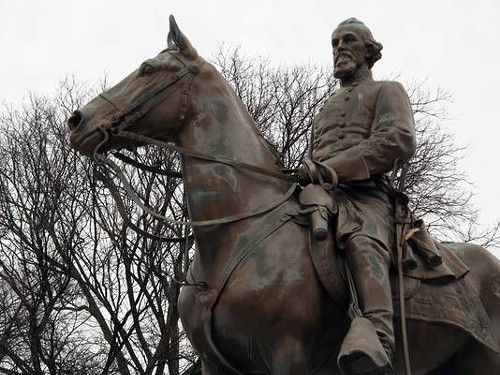
Nathan Bedford Forrest Statue in the Health Sciences Park.
The attorney for the Memphis City Council says that the city will continue to push for the relocation of the remains and statue of Nathan Bedford Forrest from the Health Sciences Park in the Medical District.
Attorney Allan Wade said that the Tennessee Historical Commission failed to properly adopt the criteria of the Tennessee Heritage Protection Act of 2013, which was used to deny the city’s application for a waiver that would allow for relocation of the statue and remains of the Confederate Army general, slave trader, and Ku Klux Klan founding member.
“The Commission’s denial of the city’s petition was invalidated due to the failure of the Commission to adopt the criteria used to deny the petition in accordance with the Tennessee Administrative Procedure Act.”
Wade says that the Commission must now start from scratch and properly adopt criteria, which could take until June. Meanwhile, the city has filed a petition that identifies the grounds for voiding the Commission’s decision to deny Memphis’s waiver application.
In minutes obtained from the Commission’s Oct. 21, 2016 meeting where the Commission denied Memphis’ application, Commissioner Chairman Reavis Mitchell noted that Memphis’ application was submitted on March 7, 2016, five days before Gov. Bill Haslam signed into law the Tennessee Heritage Protection Act of 2016, therefore the application fell under the 2013 version of the law.
Mitchell said that the Commission adopted the updated waiver criteria. The city’s petition to the commission states otherwise.
The controversy over renaming and relocating Confederate-themed parks in Memphis began in 2013, when city council hurriedly passed a resolution to rename three city parks before the Tennessee state legislature could pass measures to prevent such efforts.
Following the racially motivated terrorist killings of nine black parishioners in a Charleston church in 2015, public pressure to remove Confederate symbols on public grounds began to swell across the Southeast states began, and hasn’t yet waned completely.
Recently, the U.S. Fifth Circuit Court of Appeals gave the city of New Orleans the go-ahead to remove statues of Confederate leaders Jefferson Davis and Robert E. Lee. The same court is also expected to eventually issue an opinion on whether or not the Confederate battle flag portion of the Mississippi state flag should be removed.